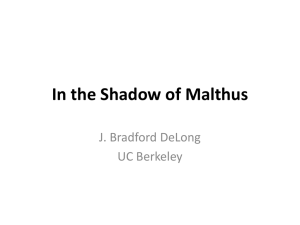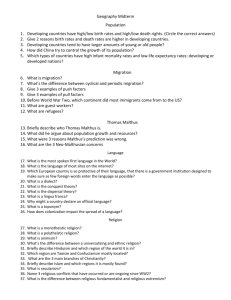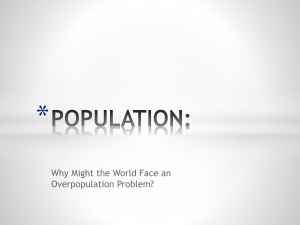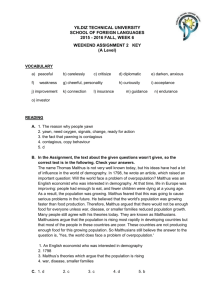A PERSPECTIVE ON THE PERSISTENT CONCERN WITH GLOBAL POPULATION GROWTH:
advertisement
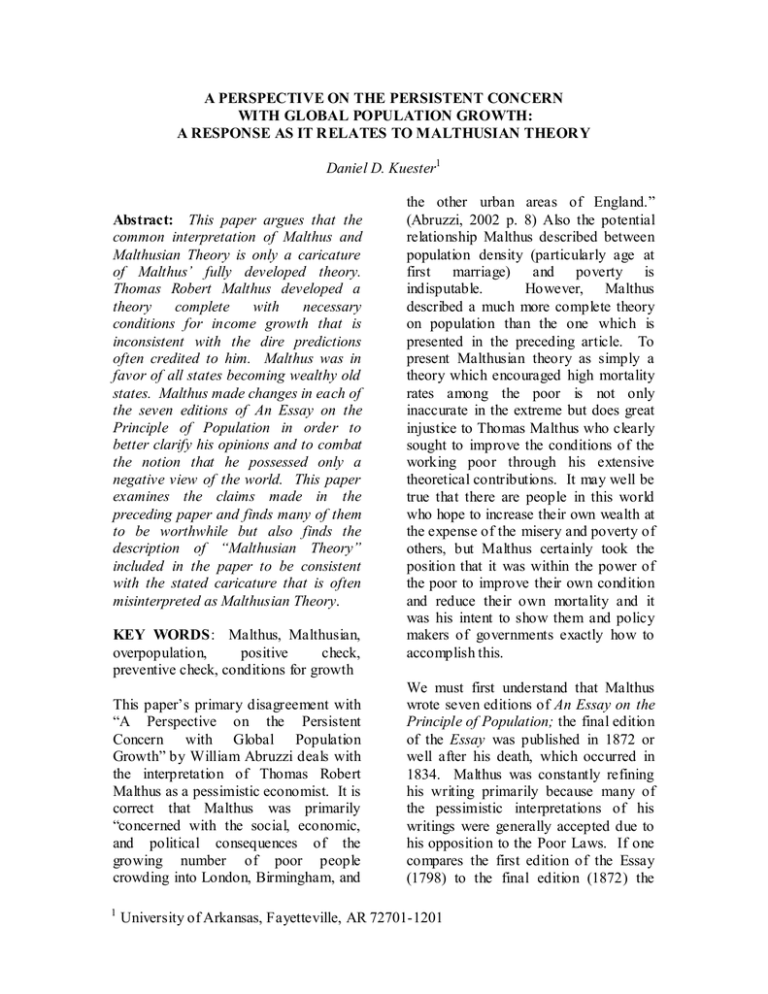
A PERSPECTIVE ON THE PERSISTENT CONCERN WITH GLOBAL POPULATION GROWTH: A RESPONSE AS IT RELATES TO MALTHUSIAN THEORY Daniel D. Kuester1 Abstract: This paper argues that the common interpretation of Malthus and Malthusian Theory is only a caricature of Malthus’ fully developed theory. Thomas Robert Malthus developed a theory complete with necessary conditions for income growth that is inconsistent with the dire predictions often credited to him. Malthus was in favor of all states becoming wealthy old states. Malthus made changes in each of the seven editions of An Essay on the Principle of Population in order to better clarify his opinions and to combat the notion that he possessed only a negative view of the world. This paper examines the claims made in the preceding paper and finds many of them to be worthwhile but also finds the description of “Malthusian Theory” included in the paper to be consistent with the stated caricature that is often misinterpreted as Malthusian Theory. KEY WORDS: Malthus, Malthusian, overpopulation, positive check, preventive check, conditions for growth This paper’s primary disagreement with “A Perspective on the Persistent Concern with Global Population Growth” by William Abruzzi deals with the interpretation of Thomas Robert Malthus as a pessimistic economist. It is correct that Malthus was primarily “concerned with the social, economic, and political consequences of the growing number of poor people crowding into London, Birmingham, and 1 the other urban areas of England.” (Abruzzi, 2002 p. 8) Also the potential relationship Malthus described between population density (particularly age at first marriage) and poverty is indisputable. However, Malthus described a much more complete theory on population than the one which is presented in the preceding article. To present Malthusian theory as simply a theory which encouraged high mortality rates among the poor is not only inaccurate in the extreme but does great injustice to Thomas Malthus who clearly sought to improve the conditions of the working poor through his extensive theoretical contributions. It may well be true that there are people in this world who hope to increase their own wealth at the expense of the misery and poverty of others, but Malthus certainly took the position that it was within the power of the poor to improve their own condition and reduce their own mortality and it was his intent to show them and policy makers of governments exactly how to accomplish this. We must first understand that Malthus wrote seven editions of An Essay on the Principle of Population; the final edition of the Essay was published in 1872 or well after his death, which occurred in 1834. Malthus was constantly refining his writing primarily because many of the pessimistic interpretations of his writings were generally accepted due to his opposition to the Poor Laws. If one compares the first edition of the Essay (1798) to the final edition (1872) the University of Arkansas, Fayetteville, AR 72701-1201 difference is staggering. The first edition contains less than 20% of the material that can be found in the final edition of the Essay. Malthus recognized that many of the ideas he published in the first edition had been misinterpreted or oversimplified so he continually attempted to clarify his position in order to give a more complete interpretation. it is correct that there are many authors that have these views, they are not Malthusians. The theory of Malthus described above is merely a caricature of Malthus’ theory. Malthus possessed a much more fully developed theory that actually allowed for income growth and prosperity in a nation due to individuals practicing moral restraint. Malthus did not endorse birth control officially (although there is some evidence that this was simply because of his status as a reverend) so to assume that he would be in favor of forced sterilization (as the previous paper implies) is incorrect. Malthus was constantly refining his work and considering additional empirical evidence. For instance, he introduced the following quote to the second edition of the Essay and it was included in every subsequent edition. There are many examples of Malthus refining his work to exclude the most pessimistic predictions, which had wrongly been assumed to be Malthus’ entire theory. One example is in this quote (which is quite similar to the quote included in the previous article) that only appeared in the second edition of the Essay. “The main principle advanced is so incontrovertible, that if I had confined myself merely to general views, I could have entrenched myself in an impregnable fortress, and the work in this form would probably have had a much more masterly air. But such general views though they may advance the case of abstract truth, rarely tend to promote any practical good;” (Malthus, 1872 p. vii) “A man who is born into a world already possessed, if he cannot get subsistence from his parents on whom he has a just demand and if society do not want his labour, has no claim of right to the smallest portion of food, and, in fact, has no business to be where he is. At nature’s mighty feast there is no vacant cover for him. She tells him to be gone, and will quickly execute her own orders if he do not work on the compassion of some of her guests. If these guests get up and make room for him, other intruders immediately appear demanding the same favour. The report of a provision for all that come fills the hall with numerous claimants. The order and harmony of the feast is disturbed, the plenty that before reigned is changed into scarcity; and the happiness of the Malthus was obviously concerned about being misinterpreted or having his theory oversimplified. He proposed a much fuller theory than he is commonly given credit for. Abruzzi describes Malthusians as those individuals who understand Malthusian theory as “… an elitist … theory (which) provide(s) a rather easy justification for the application of coercive measures of population control, because the policies and programs were seen as being applied to intellectually, morally and/or culturally inferior individuals and social groups.” (Abruzzi, 2002, p. 10) While 2 guests is destroyed by the spectacle of misery and dependence in every part of the hall, and by the clamorous importunity of these who are justly enraged at not finding the provisions which they had been taught to expect. The guests learn too late their error, in counteracting those strict orders to all intruders, issued by the great mistress of the feast, who wishing that all her guests should have plenty, and knowing that she could not provide for unlimited numbers, humanely refused to admit fresh comers when here table was already full.” (Malthus, 1803 (Essay 2nd Edition) from Winch, 1996 p. 221) This quote is not consistent with Malthus’ theory of population; in fact it is completely inconsistent with his full theory of population. The “opposite mode” according to Malthus would be a plan designed to encourage increased fertility at all costs. If that plan were to be implemented then Malthus would have believed we must increase the death rate in order to facilitate increased births. Malthus frequently used a reductio adabsurdum method of making his arguments. If the absurdity is ridiculous (as it was in the above quote) then the plan (in this case to increase fertility at all costs) must also be false. Malthus used this same method to demonstrate the absurdity of not having balanced checks to population. (Kuester and Loschky, Working paper) One has to understand that Malthus was attempting to dispute utopian theories that he believed were utopian when he was writing the second edition of the Essay. However, after Malthus became aware that the above quote was being cited as his entire theory he removed it from subsequent editions of the Essay. This quote is still frequently used to (incompletely) describe Malthusian theory today. So why did Malthus make such changes to the Essay? Was it because he was no longer concerned about the potential impact of overpopulation? No, Malthus was always fearful of the dominance of the positive check. The positive check dealt with the death rate, Malthus pointed out that if the resource base was insufficient to support the population of a state that high mortality rates could occur. High levels of disease, famine, war and pestilence were examples of a strong positive check. Malthus wanted all societies to posses a strong preventive check. A strong preventive check indicates that members of a society are delaying age at first marriage and family formation. The fertility rate is lower and the pressure on the available resource base is insufficient to strengthen the positive check. Abruzzi (2002) does perpetuate some myths about Malthus. An example is this quote in the preceding article that is from a chapter entitled “of the consequences of pursuing the opposite mode”. “Instead of recommending cleanliness to the poor, we should encourage contrary habits. In our towns, we should make the streets narrower, crowd more people into the houses and court the return of the plague. In the country we should reprobate specific remedies for ravaging diseases.” (Abruzzi, p. 10 from Malthus, 1836) Malthus did claim that populations that increased too quickly would create a strain on the resource base and 3 potentially could lead to abject poverty. However, Malthus was quick to point out the relationship between the available resources and the population was what determined the level of poverty in a nation. Malthus did not simply look at population density as an indicator of per capita GDP. Malthus described three types of states in the Essay: wealthy old states were characterized by a strong preventive check and a weak positive check, poor old states were characterized by a strong positive check and a weak preventive check and new states were characterized by a weak positive and a weak preventive check. Malthus’ description of populations that had populations doubling every twenty-five years (or potentially faster) was to demonstrate the absurdity of unbalanced checks in an old state. It was possible (and not a concern to Malthus) for a population to rapidly grow without creating higher mortality rates if the resource base was sufficient to sustain this growth. ourselves with the ratio of population to the available resource base as opposed to simply looking at population density as an indicator of a society’s prosperity and concerns about overpopulation. In other words we should only be concerned with a weak preventive check in a society where a man who has a family will be unable to support that family due to low wages and insufficient resources. “In a general view of the American continent, as described by historians, the population seems to have been spread over the surface very nearly in proportion to the quantity of food which the inhabitants of the different parts, in the actual state of their industry and improvement could obtain and that, with few exception, it pressed hard against this limit, rather than fell short of it.” (Malthus, 1872, p. 28). “The sum of all these preventive and positive checks, taken together, forms the immediate check to population; and it is evident that, in every country where the procreative power cannot be called into action, the preventive and the positive checks must vary inversely as each other; that is countries either naturally unhealthy or subject to a great mortality, from whatever cause it may arise, the preventive check will prevail very little. In these countries, on the contrary, which are naturally healthy and where the preventive check is found to prevail with considerable force, the positive check will prevail very little, or the mortality be very small.” (Malthus, 1872, p.9) In developed states the relative strength of the positive and the preventive check is what determined whether a society would be prosperous or not. The preventive check deals directly with the ability of a man to support his family. If he has a high enough standard of living or lives on fertile land that has not been overdeveloped (perhaps land that is not too arid) he should be able to have a family without fear of a diminished standard of living. Malthus did believe that the preventive check could be strong which would be indicative of a wealthy old state. Malthus was not concerned about the past population growth in the United States; he was only concerned about the potential for this nation to overtax its resource base in the future. This theory can apply to the preceding paper. It might be more useful to concern 4 Malthus understood that wealthy old states did exist and he also described in great detail the conditions that were necessary for growth. (Kuester and Loschky, Working paper) Malthus described four necessary conditions for income growth, they are: education, property rights, civil and political liberties and the availability of luxury goods. There is significant evidence that these conditions were not only necessary but also sufficient for growth. Whether these conditions were sufficient for growth or not the fact that Malthus developed a blueprint for a nation to become a wealthy old state demonstrates that he had a well-developed theory of population and income growth. This is wholly inconsistent with the idea that he encouraged famine, disease, pestilence or a strong positive check in general. Malthus was not solely interested in protecting the wealthiest members of society by attempting to spread disease amongst the poorer members of society. Malthus was hopeful that all members of society could enjoy a prosperous future. In Principles of Political Economy (2nd edition) Malthus describes how the existence of the necessary conditions could lead to the existence of a wealthy old state (which was his goal for all societies). themselves. The result was, that their increased corn wages, instead of occasioning an increase of population exclusively, were so expended as to occasion a decided elevation in the standard of their comforts and conveniences.” (Malthus, 1836, p. 2289) CONCLUSION The idea that policies designed to discourage overpopulation may be xenophobic or motivated by a desire to maintain the worldwide status quo is an intriguing one. The fact that this idea might stem from widespread misinterpretations of Malthusian theory is probably correct as well. This paper has argued that the idea that Malthus himself was only interested in the well being of a few while encouraging a strong positive check in a society is false. Malthus possessed a complete theory of how per capita income growth could occur. He wished to see a strong preventive check dominate in society. He wanted to see only those families who could afford to support children bear children. This is not consistent with encouraging a strong positive check as has been asserted in the previous article. “This great increase of command over the first necessary of life did not, however, produce a proportionate increase of population. It found the people of this country (England) living under a good government and enjoying all the advantages of civil and political liberty in an unusual degree. The lower classes of people had been in the habit of being respected, both by the laws and the higher orders of their fellow citizens and had learned in consequence to respect WORKS CITED Abruzzi, William (2002) “A Perspective on the Persistent Concern with Global Population Growth” Kuester, Daniel (2000) “Malthus: His Theory, His Poor Law Position, and Misunderstandings of His Work.” 5 Dissertation, University of MissouriPress, University of Missouri-Columbia Kuester, Daniel and Loschky, David. “Necessary and Sufficient Conditions for Growth in Malthusian Theory.” Working Paper, University of Arkansas Malthus, Thomas Robert. (1836) Principles of Political Economy. London. W. Pickering, 2nd Ed. Augustus M. Kelley, 1986 Malthus, Thomas Robert. (1872) An Essay on the Principle of Population. London. Reeves and Turner, 7th Ed. Augustus M. Kelley, 1986 Winch, Donald. (1996). Riches and Poverty. Cambridge, Cambridge University Press 6
